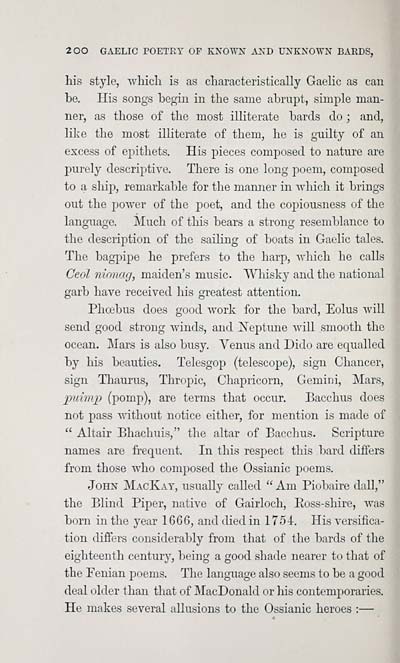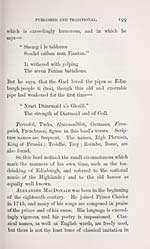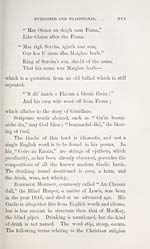Download files
Complete book:
Individual page:
Thumbnail gallery: Grid view | List view

2 00 GAELIC POETKT OF KNOWN AND UNKNOWN BARDS,
his style, whicli is as characteristically Gaelic as can
be. His songs begin in the same abrupt, simple man-
ner, as those of the most illiterate bards do ; and,
like the most illiterate of them, he is guilty of an
excess of epithets. His pieces composed to nature are
purely descriptive. There is one long poem, composed
to a ship, remarkable for the maruier in wliich it brings
out the power of the poet, and the copiousness of the
language. Much of this bears a strong resemblance to
the description of the sailing of boats in Gaelic tales.
The bagpipe he prefers to the harp, which he calls
Ceol nionag, maiden's music. Wliisky and the national
garb have received his greatest attention.
Phoebus does good work for the bard, Eolus will
send good strong winds, and Neptime will smooth the
ocean. Mars is also busy. Venus and Dido are equalled
by his beauties. Telesgop (telescope), sign Chancer,
sign Thaurus, Thropic, Chapricorn, Gemini, Mars,
puimx) (pomp), are terms that occur. Bacchus does
not pass without notice either, for mention is made of
" Altair Bhachuis," the altar of Bacchus. Scripture
names are frequent. In this respect this bard differs
from those who composed the Ossianic poems.
John MacKay, usually called " Am Piobaire dall,"
the Blind Piper, native of Gairloch, Eoss-shire, was
born in the year 1666, and died in 1754. His versifica-
tion differs considerably from that of the bards of the
eighteenth century, being a good shade nearer to that of
the Fenian poems. The language also seems to be a good
deal older than that of MacDonald or his contemporaries.
He makes several allusions to the Ossianic heroes : —
his style, whicli is as characteristically Gaelic as can
be. His songs begin in the same abrupt, simple man-
ner, as those of the most illiterate bards do ; and,
like the most illiterate of them, he is guilty of an
excess of epithets. His pieces composed to nature are
purely descriptive. There is one long poem, composed
to a ship, remarkable for the maruier in wliich it brings
out the power of the poet, and the copiousness of the
language. Much of this bears a strong resemblance to
the description of the sailing of boats in Gaelic tales.
The bagpipe he prefers to the harp, which he calls
Ceol nionag, maiden's music. Wliisky and the national
garb have received his greatest attention.
Phoebus does good work for the bard, Eolus will
send good strong winds, and Neptime will smooth the
ocean. Mars is also busy. Venus and Dido are equalled
by his beauties. Telesgop (telescope), sign Chancer,
sign Thaurus, Thropic, Chapricorn, Gemini, Mars,
puimx) (pomp), are terms that occur. Bacchus does
not pass without notice either, for mention is made of
" Altair Bhachuis," the altar of Bacchus. Scripture
names are frequent. In this respect this bard differs
from those who composed the Ossianic poems.
John MacKay, usually called " Am Piobaire dall,"
the Blind Piper, native of Gairloch, Eoss-shire, was
born in the year 1666, and died in 1754. His versifica-
tion differs considerably from that of the bards of the
eighteenth century, being a good shade nearer to that of
the Fenian poems. The language also seems to be a good
deal older than that of MacDonald or his contemporaries.
He makes several allusions to the Ossianic heroes : —
Set display mode to: Large image | Transcription
Images and transcriptions on this page, including medium image downloads, may be used under the Creative Commons Attribution 4.0 International Licence unless otherwise stated. ![]()
| Early Gaelic Book Collections > Blair Collection > Popular tales of the West Highlands > Volume 4 > (216) |
|---|
| Permanent URL | https://digital.nls.uk/76368450 |
|---|
| Shelfmark | Blair.176 |
|---|---|
| Attribution and copyright: |
|
| Description | Orally collected, with a translation by J.F. Campbell. |
|---|---|
| Shelfmark | Blair.173-176 |
| Additional NLS resources: | |
| Description | A selection of books from a collection of more than 500 titles, mostly on religious and literary topics. Also includes some material dealing with other Celtic languages and societies. Collection created towards the end of the 19th century by Lady Evelyn Stewart Murray. |
|---|
| Description | Selected items from five 'Special and Named Printed Collections'. Includes books in Gaelic and other Celtic languages, works about the Gaels, their languages, literature, culture and history. |
|---|

